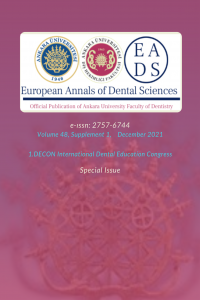Abstract
References
- 1. Akkuş N: Yaşam boyu öğrenme becerilerinin göstergesi olarak 2006 PISA sonuçlarının Türkiye açısından değerlendirilmesi. Yayınlanmamış yüksek lisans tezi, Hacettepe Üniversitesi, Sosyal Bilimler Enstitüsü, Ankara, 2008.
- 2. Kaya HE: Küreselleşme sürecinde yasam boyu öğrenme ve yetişkin eğitimi gerçeği. Akademik İncelemeler Dergisi, 2014;9(2):91.
- 3. Adnan M, Anwar K. Online learning amid the COVID-19 pandemic: Students' perspectives. Journal of Pedagogical Sociology and Psychology. 2020;2(1):45-51.
- 4. Coşkun YD: Üniversite öğrencilerinin yaşam boyu öğrenme eğilimlerinin bazı değişkenler açısından incelenmesi. Yayınlanmamış doktora tezi. Hacettepe Üniversitesi, Sosyal Bilimler Enstitüsü, Ankara, 2009.
- 5. Arslan ŞF, Sarıkaya Ö, Vatansever K: Yaşam boyu öğrenme eğilimi ölçeğinin tıp eğitimi alanı için geçerlik ve güvenirlik çalışması. Tıp Eğitimi Dünyası, 2007;15(47):38-46.
- 6. Karaduman A and Tarhan S: Üniversite öğrencilerinin yaşam boyu öğrenme eğilimleri ile öz yeterlik algıları arasındaki ilişkinin belirlenmesi. Journal of Human Sciences, 2017;14(1):355-375.
- 7. Dikmen Y, Uslu-Yuvacı H, Erol F: Tıp fakültesi öğrencilerinin yaşam boyu öğrenme eğilimlerinin incelenmesi. International Journal of Human Sciences, 2017;14(3):2399-2408.
- 8. Günüç S, Odabaşı FH, Kuzu A: Yaşam boyu öğrenmeyi etkileyen faktörler. Gaziantep University Journal of Social Sciences, 2021;11(2):309-325.
- 9. Kılıç Ç. (2014) Öğretmen adaylarının yaşam boyu öğrenmeye yönelik algıları. Eğitim ve Öğretim Araştırmaları Dergisi. 2014;3(4):79-87.
- 10. Odabaş H, Odabaş ZY, Polat C: Üniversite öğrencilerinin okuma alışkanlığı: Ankara Üniversitesi örneği. Bilgi Dünyası. 2008;9(2):431-465.
Abstract
Aim: Dentistry education is a life-long, continuous education. The aim of this study was to determine the lifelong learning (LLL) tendencies of the dental faculty students who were receiving distance education during the Covid-19 pandemic.
Methods: 258 dentistry students participated the study. Research data was collected by 'Lifelong Learning Disposition Scale' (LDS). In the first part of the questionnaire, students were asked to reply socio-demographic questions and their ability to learn during the distance education process of the COVID-19 pandemic. In the second part, there were questions about LLL. The low score obtained from the scale indicates that the LLL tendency is high. ANOVA and t-test were used for analysis of LDS score, and the Mann Whitney-U and Kruskal Wallis tests were used for sub-dimensions.
Results: During the COVID-19 Pandemic, 40.3% of the students stated their status of learning skills as medium, 28.7% as bad and 11.6% as very bad. Students' mean score on the LDS scale was 88.26 ± 9.8. The mean LDS score was statistically significant according to their class, gender and their assessment of learning skills during the COVID-19 pandemic (p <0.05). There was no correlation between the monthly income and academic success levels of the students and their LDS scores (p> 0.05).
Conclusion: In this study, it was determined that the students made their own evaluations correctly during the Covid-19 pandemic. LDS scores of the students who stated their learning status as bad were significantly higher by 1,187 times. During the Covid-19 pandemic, it is important to communicate using educational methods that aim to support students' learning skills. Therefore, new interventions should be planned to increase students' LLL tendencies.
References
- 1. Akkuş N: Yaşam boyu öğrenme becerilerinin göstergesi olarak 2006 PISA sonuçlarının Türkiye açısından değerlendirilmesi. Yayınlanmamış yüksek lisans tezi, Hacettepe Üniversitesi, Sosyal Bilimler Enstitüsü, Ankara, 2008.
- 2. Kaya HE: Küreselleşme sürecinde yasam boyu öğrenme ve yetişkin eğitimi gerçeği. Akademik İncelemeler Dergisi, 2014;9(2):91.
- 3. Adnan M, Anwar K. Online learning amid the COVID-19 pandemic: Students' perspectives. Journal of Pedagogical Sociology and Psychology. 2020;2(1):45-51.
- 4. Coşkun YD: Üniversite öğrencilerinin yaşam boyu öğrenme eğilimlerinin bazı değişkenler açısından incelenmesi. Yayınlanmamış doktora tezi. Hacettepe Üniversitesi, Sosyal Bilimler Enstitüsü, Ankara, 2009.
- 5. Arslan ŞF, Sarıkaya Ö, Vatansever K: Yaşam boyu öğrenme eğilimi ölçeğinin tıp eğitimi alanı için geçerlik ve güvenirlik çalışması. Tıp Eğitimi Dünyası, 2007;15(47):38-46.
- 6. Karaduman A and Tarhan S: Üniversite öğrencilerinin yaşam boyu öğrenme eğilimleri ile öz yeterlik algıları arasındaki ilişkinin belirlenmesi. Journal of Human Sciences, 2017;14(1):355-375.
- 7. Dikmen Y, Uslu-Yuvacı H, Erol F: Tıp fakültesi öğrencilerinin yaşam boyu öğrenme eğilimlerinin incelenmesi. International Journal of Human Sciences, 2017;14(3):2399-2408.
- 8. Günüç S, Odabaşı FH, Kuzu A: Yaşam boyu öğrenmeyi etkileyen faktörler. Gaziantep University Journal of Social Sciences, 2021;11(2):309-325.
- 9. Kılıç Ç. (2014) Öğretmen adaylarının yaşam boyu öğrenmeye yönelik algıları. Eğitim ve Öğretim Araştırmaları Dergisi. 2014;3(4):79-87.
- 10. Odabaş H, Odabaş ZY, Polat C: Üniversite öğrencilerinin okuma alışkanlığı: Ankara Üniversitesi örneği. Bilgi Dünyası. 2008;9(2):431-465.
Details
| Primary Language | English |
|---|---|
| Subjects | Dentistry |
| Journal Section | Conference Papers |
| Authors | |
| Publication Date | December 1, 2021 |
| Submission Date | March 9, 2021 |
| Published in Issue | Year 2021 Volume: 48 Issue: Suppl 1 |


